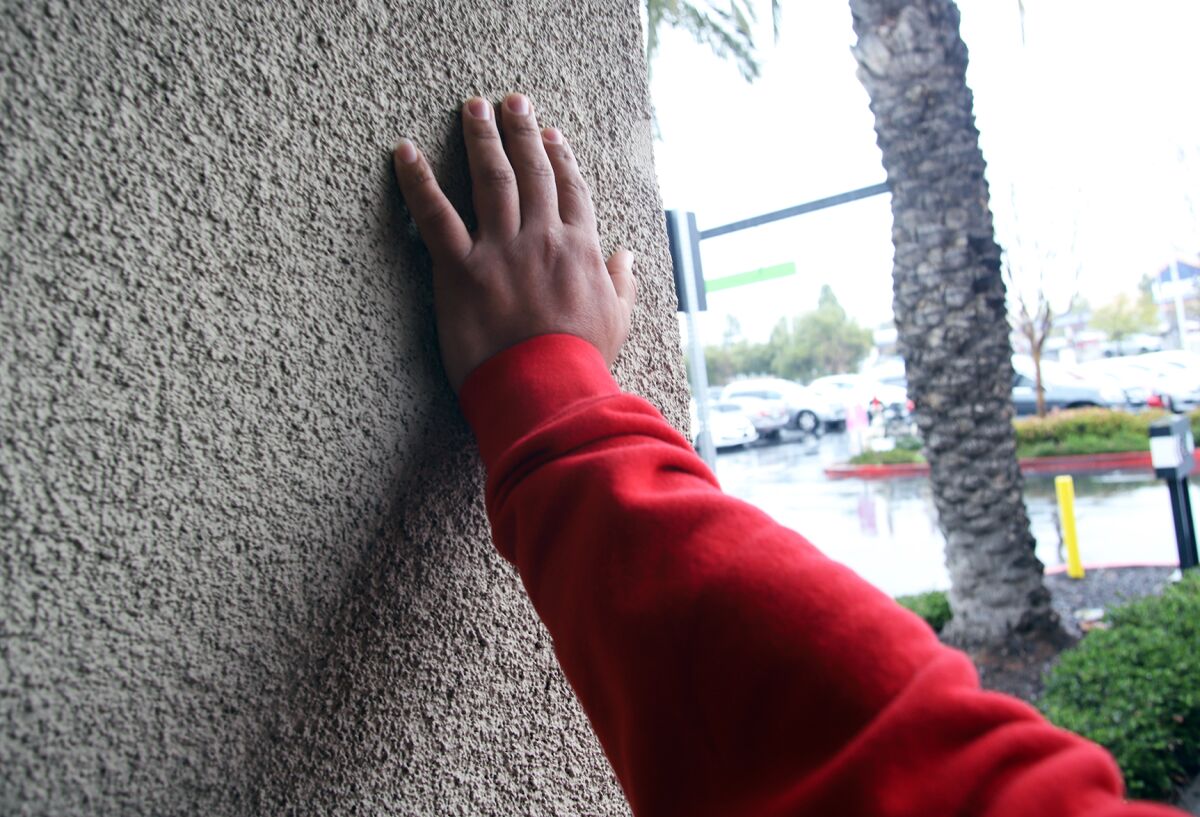His face contorted with concern, Cesar Hernández sat down at a coffee shop in northern Moreno Valley, greeted a reporter politely, then suddenly covered his mouth and coughed for a few seconds before he was able to speak.
“Sorry,” said Hernández, 37. “It’s the cough that keeps bothering me.”
The Mexico native cleared his throat and continued.
“My story is the story of many immigrants whose concern now is our health and the fear of what may happen to us in the future.”
The lawsuit by Cesar Hernández and six other people alleges that GEO Group employees used a disinfectant that harmed more than 1,300 detainees at the Adelanto Immigration and Customs Enforcement Processing Center in San Bernardino County.
(James Carbone / Los Angeles Times)
Hernández is one of seven people who are part of a class action lawsuit filed on March 20 by the Social Justice Legal Foundation against GEO Group Inc., a private prison corporation that operates in the United States, Australia, South Africa and the United Kingdom.
The lawsuit alleges that GEO Group engaged in a “months-long poisoning” of more than 1,300 detainees at the Adelanto Immigration and Customs Enforcement Processing Center in San Bernardino County when its employees recklessly sprayed a cleaning agent during in the early stages of the COVID-19 pandemic, purportedly to prevent the spread of infection, inside what the lawsuit characterizes as the center’s poorly ventilated facilities.
The lawsuit states that, “prior to the pandemic, although improperly used in poorly ventilated spaces, GEO staff primarily used HDQ Neutral as a cleaning product. But starting in February 2020, GEO staff began using HDQ Neutral in wide-area spraying as a purported COVID-19 safety measure. GEO staff sprayed HDQ Neutral indoors directly into the air and on all types of surfaces.”
The lawsuit adds that “HDQ Neutral was sprayed throughout all areas of the Facility, including the front lobby, administrative areas, living areas, food and microwave areas, day room, corridors, intake units, and medical units. In the living areas, GEO staff would spray onto all surfaces including on soft, porous surfaces like mattresses and sheets.”

Cesar Hernández, leaning his hand against a wall, says doctors recently found blood clots in his lungs, which, he believes, are a result of prolonged exposure to the disinfectant HDQ Neutral used at Adelanto.
(James Carbone / Los Angeles Times)
As a result, the lawsuit alleges, the immigrant plaintiffs suffered multiple effects of their exposure to the chemical HDQ Neutral, including nosebleeds, blood in the mouth and saliva, headaches and dizziness. One female former detainee said she still suffers from headaches and nosebleeds since being released nearly three years ago. The defendants seek to hold GEO liable for compensatory damages and payment of medical follow-up expenses and expenses over the next five years.
Hernández, who in September 2020 was picked up by ICE and brought to the detention center, is among those who say they still are living with the effects.
“At Adelanto Detention Center my nightmare began, and it still hasn’t ended,” Hernández said, adding that doctors recently found blood clots in his lungs, a result of prolonged exposure to the chemical, he believes. He is currently being treated with anticoagulants that cost $540 a month. Hernández doesn’t have health insurance.
“This lawsuit bears witness not only to my story, but to more than a thousand people,” he said.
According to the lawsuit, in the wake of the pandemic, GEO Group staff began spraying the chemical throughout the facility in February 2020 and continued through April 2021.
By the time Hernández arrived at the detention center, the pinkish-red chemical with a distinctive bleach odor was used every 30 minutes, 24 hours a day, seven days a week, he said.
GEO Group Inc., which has been the subject of controversy and criticism over the years for the management of its facilities, including allegations of mistreatment of inmates and inadequate staffing, issued a statement denying the lawsuit’s allegations and asserting that its cleaning products are used securely at all ICE processing centers.
“GEO uses cleaning products that are regulated by the EPA (United States Environmental Protection Agency) and are always used in accordance with the manufacturer’s guidelines, as well as all applicable sanitation standards established by the Federal Performance-Based Detention Nationals,” the statement read.

Cesar Hernández says he and many other former Adelanto detainees still suffer today after prolonged exposure to HDQ Neutral. “There was no reason for them to treat us worse than animals,” he says.
(James Carbone / Los Angeles Times)
GEO Group said that its cleaning products are used safely across the country in many different settings, including hospitals, nursing homes, youth centers, and colleges and universities.
For several years, GEO Group has been locked in a legal battle with the state of California, which is seeking to shut down all private prisons. In October 2021, a panel of the U.S. 9th Circuit Court of Appeals ruled that California must exempt federal immigration detention centers from its ban on for-profit prisons.
GEO Group said that the Adelanto lawsuit’s allegations “are part of a radical politically motivated campaign to attack ICE contractors, abolish ICE and end federal immigration detention.”
ICE declined to comment on the lawsuit, issuing a statement that “ICE does not comment on ongoing or pending litigation.”
According to the safety data sheet for Spartan Chemical Co. Inc., the company that manufactures and distributes the product, inappropriate exposure to HDQ Neutral causes redness and pain on exposed skin, as well as blistering and swelling.
The company also warns that contact of HDQ Neutral with the eyes can cause permanent damage to the conjunctiva and tissue damage and that inhalation can lead to coughing, as well as as irritation or damage to the mucous membranes of the respiratory tract. Long-term exposure to the product has been linked to infertility, birth defects, asthma, and other respiratory and reproductive harm.
Spartan suggests the use of gloves, goggles when using the product, not inhaling fumes, diluting the chemical with water and limiting its use to places with good ventilation.
However, a July 2020 report issued by the EPA after it conducted a virtual inspection of the Adelanto facility stated that GEO employees and detainees volunteering to work on cleanup applied HDQ Neutral inside the facility without receiving proper safety instructions.
The EPA advised GEO Group “to take all necessary action to ensure that any further use of pesticides takes place in accordance with the directions and precautionary statements on the pesticide label, and in full compliance with the provisions of FIFRA [the Federal Insecticide, Fungicide, and Rodenticide Act]. Failure to do so could subject you to further enforcement action.”
As Hernández coughed, he continued to share his story of how he ended up at Adelanto.
One morning in mid-September 2020, the father of two was awakened at his Riverside home by loud knocking and men shouting, “Open the door. We are the police. Come out of your home.” In fact, Hernández said, the men were ICE agents.
The agents told Hernández, who worked as chief maintenance engineer at Ayres Hotel & Spa Moreno Valley, that they had a warrant out for his arrest. Without further words, they transported him to the Adelanto Detention Center, the largest ICE detention facility in the United States, with a capacity of 2,690.
“The torment loop started when I stepped into the center,” Hernández said.
Every detainee had to quarantine for 21 days in a dormitory with five, six or seven others, after which detainees were transferred to mostly two-person cells. During his first days at the center Hernández realized HDQ Neutral was being sprayed every 30 or 45 minutes on staircase handrails, door knobs, showers, sinks, telephones, tables and straight into the air, he said.
“This left white spots all over the place, stains that we all recognized and that nobody wanted to touch,” Hernández said. At mealtimes, some detainees tried to cover their food to keep it from being contaminated.
Every time GEO workers sprayed the chemical, Hernandez said, his nose and eyes itched, he had trouble breathing and felt nauseous.

Former Adelanto detainee Cesar Hernández says his health has deteriorated so much that he can’t work for now. His wife covers most of their household expenses.
(James Carbone / Los Angeles Times)
Each night, GEO staff sprayed the pink liquid in or around bunk beds and cells where people were sleeping, Hernández said. When detainees asked why, the response was, “We are just doing our job.”
“There was no reason for them to treat us worse than animals,” Hernández said.
The lawsuit comes two years after the Inland Coalition for Immigrant Justice, a nonprofit organization that advocates for immigrant rights in Southern California, filed a complaint against Adelanto in May 2020, alleging that HDQ Neutral was used more than 50 times a day inside the center.
In September 2020, a federal judge upheld the complaint and ordered GEO Group to stop using HDQ Neutral, but the company apparently continued its practices, said Eddie Torres, policy coordinator for the Inland coalition.
“The complaints were not from an organization just to discredit the Geo Group company, but because we wanted to hold them accountable for using a toxic product in an irresponsible way, and because the lives of many are still at risk,” Torres said.
Pilar González Morales, managing attorney of the Social Justice Legal Foundation, said that it is imperative that the government apply strict measures to regulate the use of the chemical, which she said has been used at some other GEO-operated detention centers.
González Morales said the lawsuit is part of a movement aimed at allowing immigrants to avoid being held in detention centers while waiting for their cases to be heard in immigration courts.
“This type of practice is a sign that detention centers are useless,” she said.
Hernández spent five months in detention before being released in February 2021. But he said that his health has deteriorated so much that he no longer can work as a handyman, because common chemicals such as paint thinners or those used to unclog drains aggravate his condition. He had to stop working in November. For now, his wife covers most of the household expenses by working as a nutrition coach.
Another detainee, Miriam Scheetz, 59, said she still suffers from nose bleeds and chronic headaches since being held at Adelanto from March 2019 to August 2020.
When she entered the center, the guards gave her the job of cleaning tables, the dining room and bathrooms, for about six hours a day, six days a week, for $19 a month. Prior to the pandemic, the use of HDQ Neutral diluted with water was commonly used for cleaning, Scheetz said. But when the pandemic began, GEO workers asked her to use the liquid in its pure form, she said.
“I had to obey, but we were never given instructions on how to use the product, we never wore goggles or gloves to cover ourselves, despite our request,” she said.
“The guards said that the liquid was to kill viruses, and I answered them, ‘But the virus is not me.’ They were ignoring me,” she said.
Just a few days later, Scheetz said, she began to suffer from dizziness, nausea, vomiting, blood in her saliva, and headaches. Over the following months her visits to doctors became continuous, but she was prescribed only ibuprofen.
The Victorville resident said that there were people who, as soon as they opened the chemical canisters, had a headache. Others attributed the discomfort to the stress of long confinement.
“Once I passed out, they put me under observation, but neither a doctor nor a nurse ever came.” The guards only came once, and “they threw my food on the floor,” she said in a telephone interview.
Holly Cooper, co-director of the UC Davis Law School Immigration Law Clinic and a nationally recognized expert on immigration detention issues, said that she thinks that “it’s very common for the prison system, including immigration detention centers, to have a system that is unhealthy for detainees.”
“In the case of GEO, the company was notified that the chemical was causing adverse reactions in the detainees. The federal government sanctioned it, the state government conducted an inspection, and they persisted in doing so. At that time, it is cruel intent to continue the practice when you have been told there are consequences,” Cooper said.
Ingrid Eagly, professor of law at the UCLA School of Law and director of the Faculty of Criminal Justice Program, said ICE and GEO have a responsibility to make sure that people in their care are safe and that their civil rights are respected.
“This is just one example of what people say lives inside those places,” Eagly said. “Politicians have a lot of homework to do.”
This story originally appeared on LA Times

